高中英语-英语连词复习资料课件(共36张PPT)
文档属性
| 名称 | 高中英语-英语连词复习资料课件(共36张PPT) |  | |
| 格式 | zip | ||
| 文件大小 | 96.5KB | ||
| 资源类型 | 教案 | ||
| 版本资源 | 通用版 | ||
| 科目 | 英语 | ||
| 更新时间 | 2018-11-30 11:05:45 | ||
图片预览


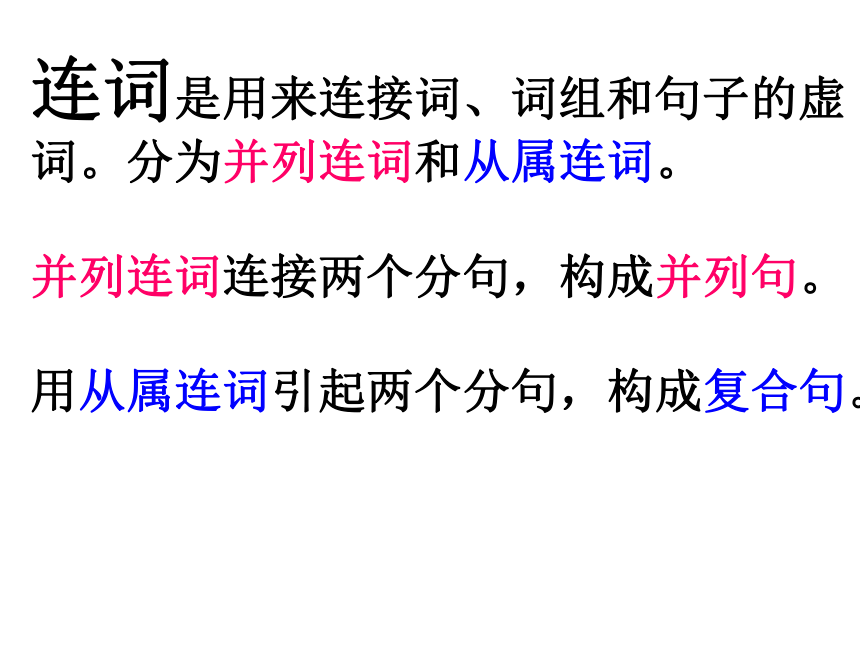
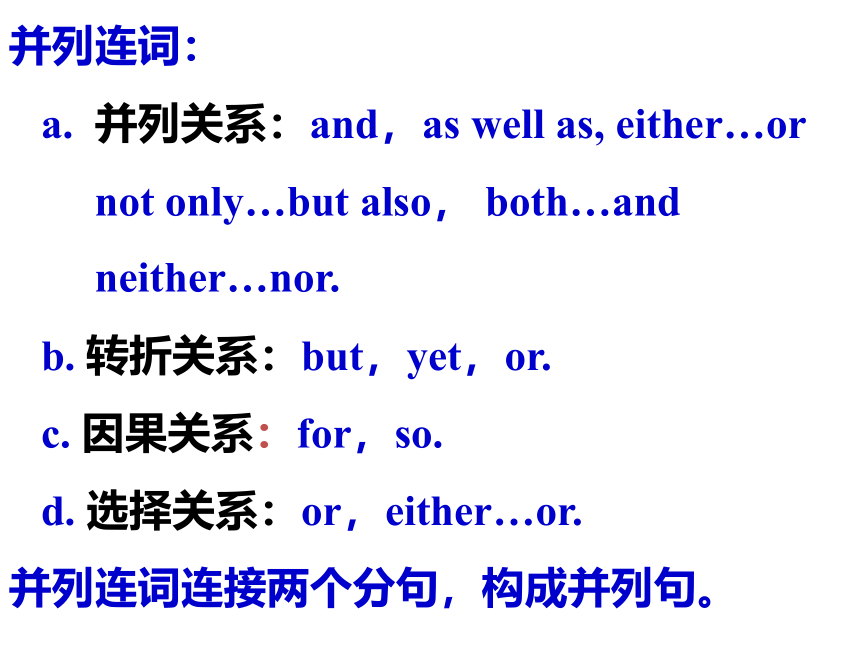
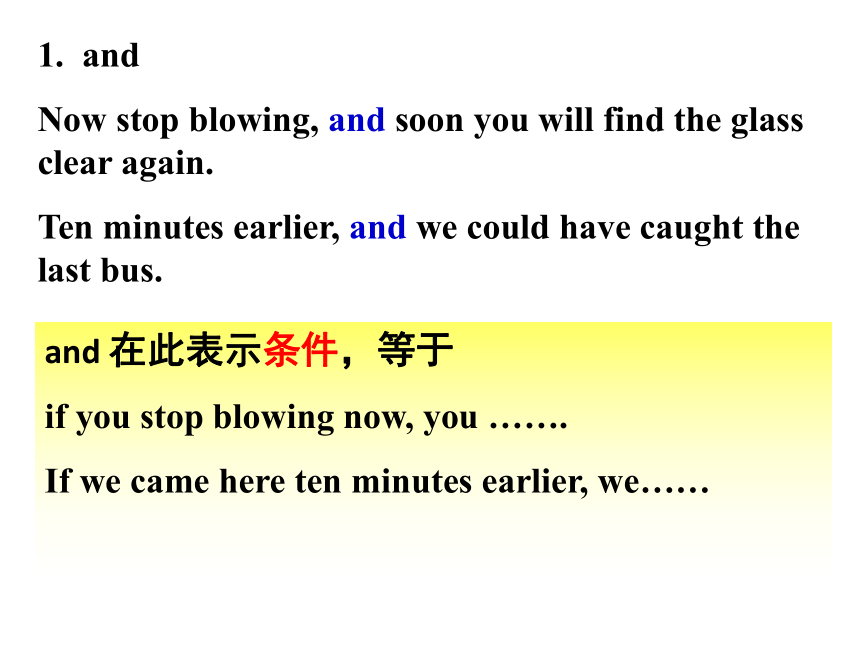

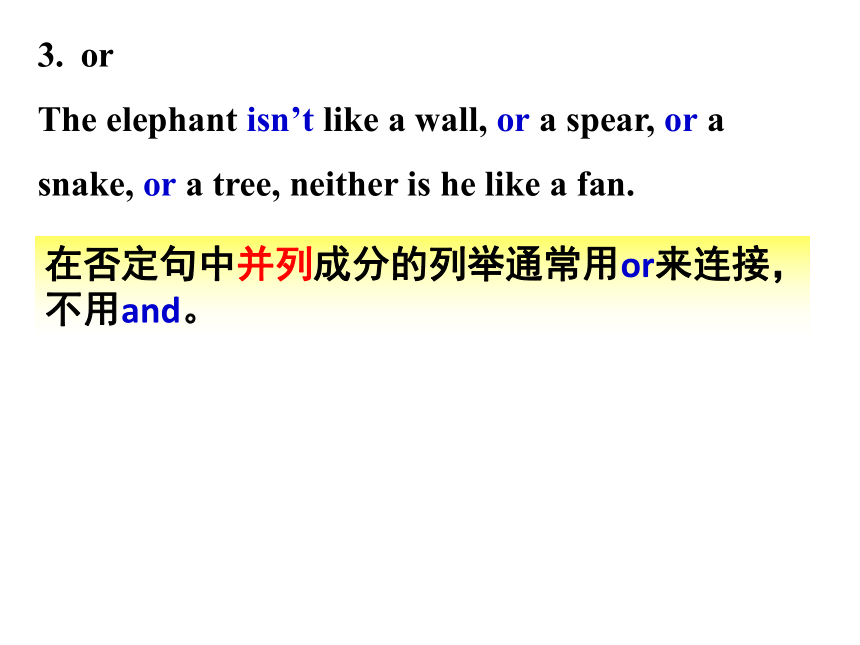
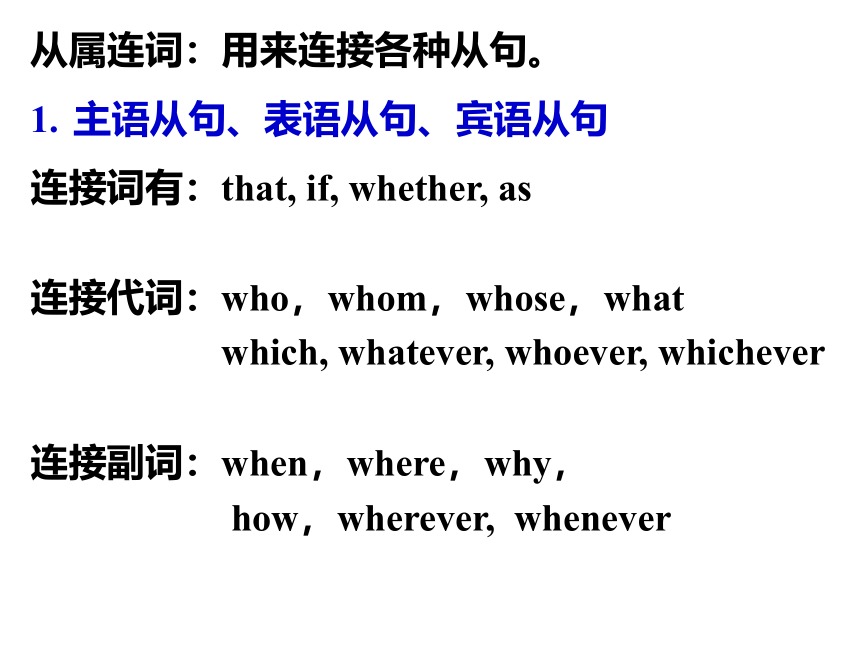
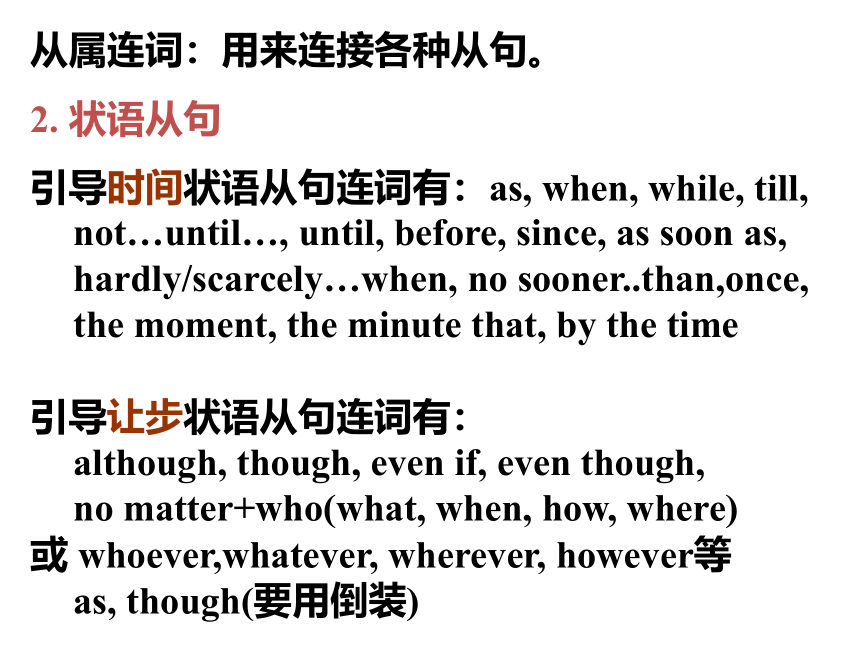
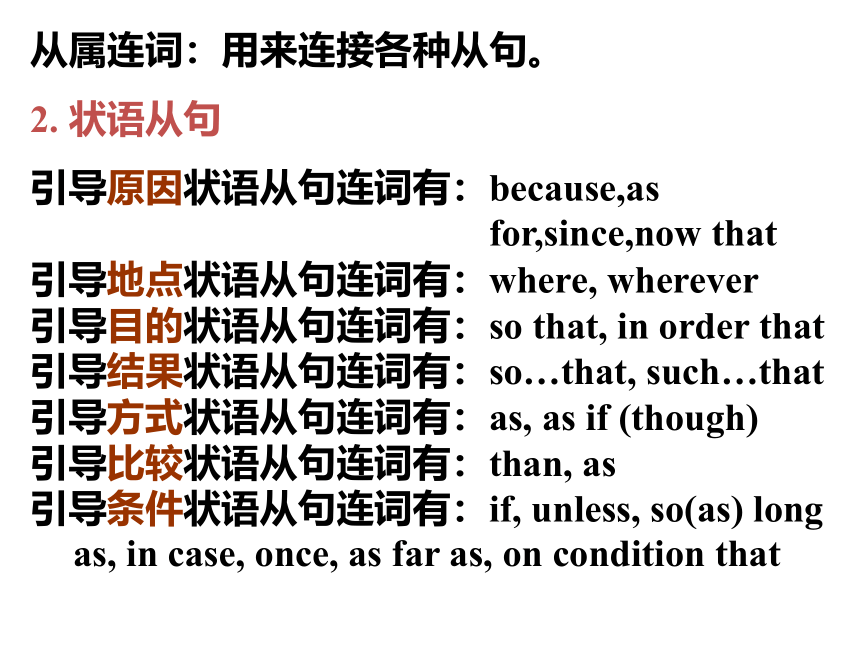
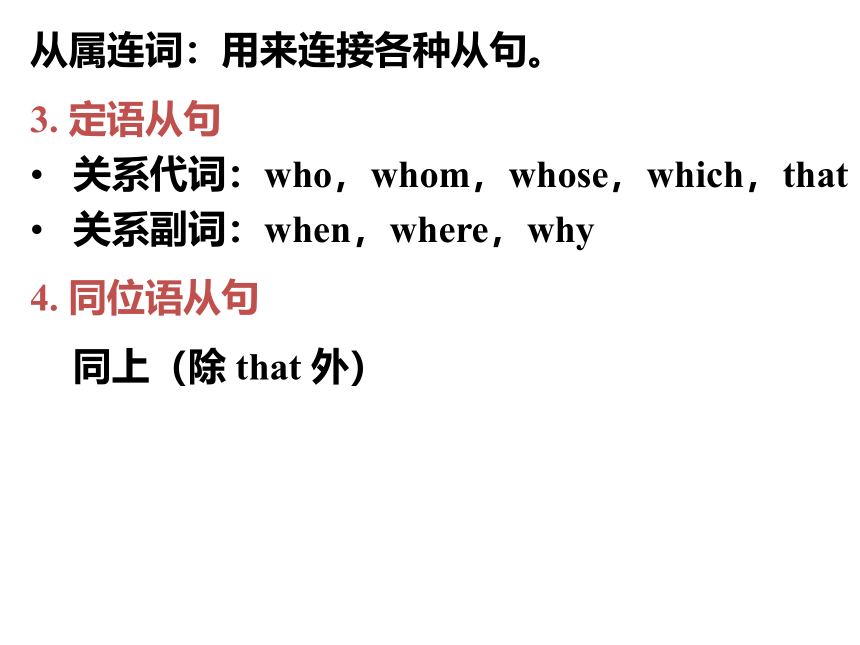

文档简介
课件36张PPT。连词概念连词是一种虚词,它不能独立地担任句子成分,只是连接词与词、短语与短语以及句子与句子的作用。
英语中连词只要分两类:并列与从属连词。
并列连词:用来连接平行的词、短语或分句。
从属连词:用来引导一个从句。连词是用来连接词、词组和句子的虚词。分为并列连词和从属连词。
并列连词连接两个分句,构成并列句。
用从属连词引起两个分句,构成复合句。 并列连词:
a. 并列关系:and,as well as, either…or
not only…but also, both…and
neither…nor.
b. 转折关系:but,yet,or.
c. 因果关系:for,so.
d. 选择关系:or,either…or.
并列连词连接两个分句,构成并列句。1. and
Now stop blowing, and soon you will find the glass clear again.
Ten minutes earlier, and we could have caught the last bus.and 在此表示条件,等于
if you stop blowing now, you …….
If we came here ten minutes earlier, we……
2. not only…but also/ as well as
Not only the mother but also the children are sick.
The mother as well as the children is sick.
不但妈妈而且孩子也病了。不但孩子们而且妈妈也病了。连接主语时, 强调的方面不同,谓语动词在人称、数上也要调整。or
The elephant isn’t like a wall, or a spear, or a
snake, or a tree, neither is he like a fan.
在否定句中并列成分的列举通常用or来连接,不用and。从属连词:用来连接各种从句。
主语从句、表语从句、宾语从句
连接词有:that, if, whether, as
连接代词:who,whom,whose,what
which, whatever, whoever, whichever
连接副词:when,where,why,
how,wherever, whenever
从属连词:用来连接各种从句。
2. 状语从句
引导时间状语从句连词有:as, when, while, till, not…until…, until, before, since, as soon as, hardly/scarcely…when, no sooner..than,once, the moment, the minute that, by the time
引导让步状语从句连词有:
although, though, even if, even though,
no matter+who(what, when, how, where)
或 whoever,whatever, wherever, however等
as, though(要用倒装)
从属连词:用来连接各种从句。
2. 状语从句
引导原因状语从句连词有:because,as for,since,now that
引导地点状语从句连词有:where, wherever
引导目的状语从句连词有:so that, in order that
引导结果状语从句连词有:so…that, such…that
引导方式状语从句连词有:as, as if (though)
引导比较状语从句连词有:than, as
引导条件状语从句连词有:if, unless, so(as) long as, in case, once, as far as, on condition that从属连词:用来连接各种从句。
3. 定语从句
关系代词:who,whom,whose,which,that
关系副词:when,where,why
4. 同位语从句
同上(除 that 外)
一. 几组时间 状语从句
1. till, not…until…, until, before, since
Don’t get off the bus until it has stopped.
He waited for his father until (till) it was twelve
o’clock.
It will be five years before he returns from
England.Observe the following sentences.
till /until
They played volleyball until (till) it got dark.
They didn’t talk until (till) the interpreter came.
He didn’t go to bed until (till) his father came back. Till the last minute of the match we kept on playing.
Till he finished his work did he go home.
We walked till the edge of the forest. until 位于句首时,not 开头的从句中,不能用till。 until/till只能用于时间。改为as far as或toF几组时间 状语从句
2. hardly/scarcely…when, no sooner…than,
once, as soon as,
As soon as I have finished it , I’ll give you a call.
Once you show any face, he will attack you.
We had hardly got into the country when it began
to rain. (Hardly had we got into…)一……就几组时间 状语从句
3. the moment, directly, immediately,
the minute that,
He made for the door directly he heard the knock.
4. each time, every time, by the time
Each time he came to my city, he would call on
me.一……就Observe the following sentences.
1. while 是否可换为when?
Please keep quiet while others are studying.
A friend of yours came to see you while you were away.可以。 while = at the time that, during the time that
谓语动词为持续性的动词。谓语一般为进行时, 或状态动词的一般现在时。Observe the following sentences.
2. when 是否可换为while?
When I went into the lab, the teacher was doing an experiment.
He often makes mistakes when he is speaking English.when 可指一段时间,也可指一点时间。引导的状语从句的谓语动词可是终止性的, 也可是延续性的。
主句和从句的谓语可以是一般时、进行时、完成时。when 不等于 whilewhen = whileObserve the following sentences.
3. as 是否可换为while,when?
As I was walking down the street, I noticed a police car in front of number 37.as 可与when, while通用,但强调“一边…一边…”。as= when , while区别几组同义词连词:
一. when,while,as “当…时”
* when + 持续性V. // +终止性V.
e.g. He was doing his homework when I came in.
* while +持续性动作 ,表示“在…时”; 表示对比“而”
e.g. Strike while the iron is hot.
I like tea while she likes coffee .
* as + 延续性动词 ---“当…的时候”; “一边…一边”
e.g. I met her as I was coming home. (=when)
She sang as she walked home.
As he talked on he got more and more excited.几组连词区别She came up as I was cooking.
The runners started as the gun went out.It was raining when we arrived.
When we were at school, we went to the library every day.
Please don’t talk so loud while we are working. He feel asleep while/when reading.
和when/while通用,但它着重强调主句与从句的动作同时或几乎同时发生。主句的动作或事情在从句中的动作或事情的进展过程中发生,从句中的动词一般要用延续性动词。即可以表示在某一点的时候,又可以表示在某一段时间内,主句与从句的动作或事情可以同时发生也可以先后发生。二 . because(因为),since(既然), as(由于) , for (因为)
* “Why did you move there?”
“________my father found a job there.”
The man fainted(晕倒)_________ he was tired and hungry.
* ______it is known to all, the earth moves round the sun.
* _______ you can’t answer the question, perhaps we’d better ask someone else.
* The old lady doesn’t go out in winter, _____ she feels the cold a great deal.BecausebecauseAsSincefor几组连词区别下列情况只能用because
1 回答why问句时 2 用于强调句型中
3 被 not 否定时三. so that “以便,为了” (表示目的) = in order that
so that “以致于,结果”(表示结果)
He got up early so that he could catch the first bus.
He got up late so that he didn’t catch the first bus.
It was very cold, so that the water in the bowl froze.
She took medicine on time so that she might get well soon.
“为了”“结果”“结果”“为了” so…that ;such…that “如此…以致于”
⑴ 他是如此聪明的男孩,我们大家都喜欢他.
He is _______ a clever boy that all of us like him.
⑵ 她被吓坏了,以致哭了起来.
She was _____ frightened that she started crying.
⑶ 这是一个如此美丽的公园,以致人们喜欢在里面玩.
It is _____ beautiful a park that people enjoy playing in it.
⑷ There is ____ much ink in the bottle that you can use it.
⑸ There are ____ many texts in the book that we can’t finish learning this term.
?suchsosososo小结: such +名词(词组)that
so +形容词/副词 that四. “尽管” although, though, as
e.g. Although / Though it was cold, he went on working.
---?Cold as/though it was, he went on working.
Although/Though he is a child, he knows a lot.
---?Child as/though he is, he knows a lot.
Although / Though you read fast, you can’t finish the book in three days.
---?Fast as you read, you can’t finish the book in three days.小结:although/though 用于正常语序。
as/though用于倒装语序,即将表语、状语、动词原形提前!五. 疑问词+ever和 no matter+疑问词的区别
Whoever breaks the rule must be punished.
You can choose whatever you like in shop.
Whoever breaks the rule, he must be punished.
Whatever you do, you must do it well.
No matter what you do, you must do it well.
no matter who breaks the rule, he must be punished.疑问词+ever可引导名词性从句和让步状语从句
no matter+疑问词只能引导让步状语从句。六. if , whether “是否”
She asked ___________ I took sugar in my tea.
I don’t care ____it doesn’t rain.
= I don’t care ________ it rain or not.
________ he will come or not is unknown.
They discussed__________they should help her.
We are considering _________ to go.
It is still a question ________ they will finish the task in time.ifwhether / ifwhetherWhetherwhetherwhetherwhether七. whether 和 if 的区别
I don’t care whether he will attend my birthday party or not.
I don’t care whether or not he will attend my birthday party .
2. I haven’t decided whether to leave or not.
3. Whether they will go to the Great Wall is not known. 和not连用whether可接不定式引导主语从句,放在句首时,只能用whether whether 和 if 的区别
4. The question whether we will take part in the physics contest has not been decided.
The question is whether we can finish the task on time.
5. It depends on whether you want to do it or not.
引导同位语从句、表语从句,通常用whetherwhether可做介词的宾语从句的连接词 whether 和 if 的区别
6. If you work hard, you are sure to succeed.
7. I wonder if he can not do me a favor.
He had no idea if he could not finish the task in time.if可用来引导条件状语从句从句用于否定结构时,必须用ifPractice:
1. Hurry up, ______ you’ll be late.
2. Study hard, ______ you’ll make progress.
3. I had tried hard, ______ I failed.
4. I was going to jump into the river _____
the guide called out to me.
5. She could ______ read German _______
speak it well.orandbutwhenbothand6. You may ______ do it yourself ______
leave it to me.
7. I can’t swim, _________ can my sister.
8. It must be raining, _______ it is so dark
outside.
9. The problem was very hard, _________,
we worked it out in the end.eitherorneitherforotherwise10. She had much difficulty in studying English, _____we should give her more help.
11. We have studied English for only a year,
______ we can already act plays in English
12.________ he _______ I am from the north.
13. You can _______ stay at school _____
Come to spend the holiday with us.sobutNot onlybut alsoeitheror14. I don’t know him, ______ do I know where he comes from.
15. He was very tired, _____ he kept on working.
16. You may watch TV, _____ only for half an hour or so.
17. Come _____ today _______ tomorrow.
18. I was ill, and _________ could not come. nor yetbuteitherorthereforeas 引导让步,要用倒装
Child as he is, he knows a lot.
Much as I like it, I won’t buy.
Try as he would, he couldn't lift the heavy box.A. when/When B. while/While C. as/As1.____ he comes tomorrow, I shall ask him where he has been.
2.____ he was speaking, everybody listened carefully.
3.____ they picked tea, the girls sang happily.
4. Have a good look at that man ___ you pass him.
5. It was already eight o’clock ____ we got home.
6. ____ coal is burned, the chemical energy is turned into heat energy.
7. He learned to speak German ____ he was in Berlin.
8. Henry is in charge of the office_____ Mr.Smith is away.
9. I was going out _____a visitor came.
10. Some people respect him ___others are afraid of him.
ABCCAABAA/BB
英语中连词只要分两类:并列与从属连词。
并列连词:用来连接平行的词、短语或分句。
从属连词:用来引导一个从句。连词是用来连接词、词组和句子的虚词。分为并列连词和从属连词。
并列连词连接两个分句,构成并列句。
用从属连词引起两个分句,构成复合句。 并列连词:
a. 并列关系:and,as well as, either…or
not only…but also, both…and
neither…nor.
b. 转折关系:but,yet,or.
c. 因果关系:for,so.
d. 选择关系:or,either…or.
并列连词连接两个分句,构成并列句。1. and
Now stop blowing, and soon you will find the glass clear again.
Ten minutes earlier, and we could have caught the last bus.and 在此表示条件,等于
if you stop blowing now, you …….
If we came here ten minutes earlier, we……
2. not only…but also/ as well as
Not only the mother but also the children are sick.
The mother as well as the children is sick.
不但妈妈而且孩子也病了。不但孩子们而且妈妈也病了。连接主语时, 强调的方面不同,谓语动词在人称、数上也要调整。or
The elephant isn’t like a wall, or a spear, or a
snake, or a tree, neither is he like a fan.
在否定句中并列成分的列举通常用or来连接,不用and。从属连词:用来连接各种从句。
主语从句、表语从句、宾语从句
连接词有:that, if, whether, as
连接代词:who,whom,whose,what
which, whatever, whoever, whichever
连接副词:when,where,why,
how,wherever, whenever
从属连词:用来连接各种从句。
2. 状语从句
引导时间状语从句连词有:as, when, while, till, not…until…, until, before, since, as soon as, hardly/scarcely…when, no sooner..than,once, the moment, the minute that, by the time
引导让步状语从句连词有:
although, though, even if, even though,
no matter+who(what, when, how, where)
或 whoever,whatever, wherever, however等
as, though(要用倒装)
从属连词:用来连接各种从句。
2. 状语从句
引导原因状语从句连词有:because,as for,since,now that
引导地点状语从句连词有:where, wherever
引导目的状语从句连词有:so that, in order that
引导结果状语从句连词有:so…that, such…that
引导方式状语从句连词有:as, as if (though)
引导比较状语从句连词有:than, as
引导条件状语从句连词有:if, unless, so(as) long as, in case, once, as far as, on condition that从属连词:用来连接各种从句。
3. 定语从句
关系代词:who,whom,whose,which,that
关系副词:when,where,why
4. 同位语从句
同上(除 that 外)
一. 几组时间 状语从句
1. till, not…until…, until, before, since
Don’t get off the bus until it has stopped.
He waited for his father until (till) it was twelve
o’clock.
It will be five years before he returns from
England.Observe the following sentences.
till /until
They played volleyball until (till) it got dark.
They didn’t talk until (till) the interpreter came.
He didn’t go to bed until (till) his father came back. Till the last minute of the match we kept on playing.
Till he finished his work did he go home.
We walked till the edge of the forest. until 位于句首时,not 开头的从句中,不能用till。 until/till只能用于时间。改为as far as或toF几组时间 状语从句
2. hardly/scarcely…when, no sooner…than,
once, as soon as,
As soon as I have finished it , I’ll give you a call.
Once you show any face, he will attack you.
We had hardly got into the country when it began
to rain. (Hardly had we got into…)一……就几组时间 状语从句
3. the moment, directly, immediately,
the minute that,
He made for the door directly he heard the knock.
4. each time, every time, by the time
Each time he came to my city, he would call on
me.一……就Observe the following sentences.
1. while 是否可换为when?
Please keep quiet while others are studying.
A friend of yours came to see you while you were away.可以。 while = at the time that, during the time that
谓语动词为持续性的动词。谓语一般为进行时, 或状态动词的一般现在时。Observe the following sentences.
2. when 是否可换为while?
When I went into the lab, the teacher was doing an experiment.
He often makes mistakes when he is speaking English.when 可指一段时间,也可指一点时间。引导的状语从句的谓语动词可是终止性的, 也可是延续性的。
主句和从句的谓语可以是一般时、进行时、完成时。when 不等于 whilewhen = whileObserve the following sentences.
3. as 是否可换为while,when?
As I was walking down the street, I noticed a police car in front of number 37.as 可与when, while通用,但强调“一边…一边…”。as= when , while区别几组同义词连词:
一. when,while,as “当…时”
* when + 持续性V. // +终止性V.
e.g. He was doing his homework when I came in.
* while +持续性动作 ,表示“在…时”; 表示对比“而”
e.g. Strike while the iron is hot.
I like tea while she likes coffee .
* as + 延续性动词 ---“当…的时候”; “一边…一边”
e.g. I met her as I was coming home. (=when)
She sang as she walked home.
As he talked on he got more and more excited.几组连词区别She came up as I was cooking.
The runners started as the gun went out.It was raining when we arrived.
When we were at school, we went to the library every day.
Please don’t talk so loud while we are working. He feel asleep while/when reading.
和when/while通用,但它着重强调主句与从句的动作同时或几乎同时发生。主句的动作或事情在从句中的动作或事情的进展过程中发生,从句中的动词一般要用延续性动词。即可以表示在某一点的时候,又可以表示在某一段时间内,主句与从句的动作或事情可以同时发生也可以先后发生。二 . because(因为),since(既然), as(由于) , for (因为)
* “Why did you move there?”
“________my father found a job there.”
The man fainted(晕倒)_________ he was tired and hungry.
* ______it is known to all, the earth moves round the sun.
* _______ you can’t answer the question, perhaps we’d better ask someone else.
* The old lady doesn’t go out in winter, _____ she feels the cold a great deal.BecausebecauseAsSincefor几组连词区别下列情况只能用because
1 回答why问句时 2 用于强调句型中
3 被 not 否定时三. so that “以便,为了” (表示目的) = in order that
so that “以致于,结果”(表示结果)
He got up early so that he could catch the first bus.
He got up late so that he didn’t catch the first bus.
It was very cold, so that the water in the bowl froze.
She took medicine on time so that she might get well soon.
“为了”“结果”“结果”“为了” so…that ;such…that “如此…以致于”
⑴ 他是如此聪明的男孩,我们大家都喜欢他.
He is _______ a clever boy that all of us like him.
⑵ 她被吓坏了,以致哭了起来.
She was _____ frightened that she started crying.
⑶ 这是一个如此美丽的公园,以致人们喜欢在里面玩.
It is _____ beautiful a park that people enjoy playing in it.
⑷ There is ____ much ink in the bottle that you can use it.
⑸ There are ____ many texts in the book that we can’t finish learning this term.
?suchsosososo小结: such +名词(词组)that
so +形容词/副词 that四. “尽管” although, though, as
e.g. Although / Though it was cold, he went on working.
---?Cold as/though it was, he went on working.
Although/Though he is a child, he knows a lot.
---?Child as/though he is, he knows a lot.
Although / Though you read fast, you can’t finish the book in three days.
---?Fast as you read, you can’t finish the book in three days.小结:although/though 用于正常语序。
as/though用于倒装语序,即将表语、状语、动词原形提前!五. 疑问词+ever和 no matter+疑问词的区别
Whoever breaks the rule must be punished.
You can choose whatever you like in shop.
Whoever breaks the rule, he must be punished.
Whatever you do, you must do it well.
No matter what you do, you must do it well.
no matter who breaks the rule, he must be punished.疑问词+ever可引导名词性从句和让步状语从句
no matter+疑问词只能引导让步状语从句。六. if , whether “是否”
She asked ___________ I took sugar in my tea.
I don’t care ____it doesn’t rain.
= I don’t care ________ it rain or not.
________ he will come or not is unknown.
They discussed__________they should help her.
We are considering _________ to go.
It is still a question ________ they will finish the task in time.ifwhether / ifwhetherWhetherwhetherwhetherwhether七. whether 和 if 的区别
I don’t care whether he will attend my birthday party or not.
I don’t care whether or not he will attend my birthday party .
2. I haven’t decided whether to leave or not.
3. Whether they will go to the Great Wall is not known. 和not连用whether可接不定式引导主语从句,放在句首时,只能用whether whether 和 if 的区别
4. The question whether we will take part in the physics contest has not been decided.
The question is whether we can finish the task on time.
5. It depends on whether you want to do it or not.
引导同位语从句、表语从句,通常用whetherwhether可做介词的宾语从句的连接词 whether 和 if 的区别
6. If you work hard, you are sure to succeed.
7. I wonder if he can not do me a favor.
He had no idea if he could not finish the task in time.if可用来引导条件状语从句从句用于否定结构时,必须用ifPractice:
1. Hurry up, ______ you’ll be late.
2. Study hard, ______ you’ll make progress.
3. I had tried hard, ______ I failed.
4. I was going to jump into the river _____
the guide called out to me.
5. She could ______ read German _______
speak it well.orandbutwhenbothand6. You may ______ do it yourself ______
leave it to me.
7. I can’t swim, _________ can my sister.
8. It must be raining, _______ it is so dark
outside.
9. The problem was very hard, _________,
we worked it out in the end.eitherorneitherforotherwise10. She had much difficulty in studying English, _____we should give her more help.
11. We have studied English for only a year,
______ we can already act plays in English
12.________ he _______ I am from the north.
13. You can _______ stay at school _____
Come to spend the holiday with us.sobutNot onlybut alsoeitheror14. I don’t know him, ______ do I know where he comes from.
15. He was very tired, _____ he kept on working.
16. You may watch TV, _____ only for half an hour or so.
17. Come _____ today _______ tomorrow.
18. I was ill, and _________ could not come. nor yetbuteitherorthereforeas 引导让步,要用倒装
Child as he is, he knows a lot.
Much as I like it, I won’t buy.
Try as he would, he couldn't lift the heavy box.A. when/When B. while/While C. as/As1.____ he comes tomorrow, I shall ask him where he has been.
2.____ he was speaking, everybody listened carefully.
3.____ they picked tea, the girls sang happily.
4. Have a good look at that man ___ you pass him.
5. It was already eight o’clock ____ we got home.
6. ____ coal is burned, the chemical energy is turned into heat energy.
7. He learned to speak German ____ he was in Berlin.
8. Henry is in charge of the office_____ Mr.Smith is away.
9. I was going out _____a visitor came.
10. Some people respect him ___others are afraid of him.
ABCCAABAA/BB
